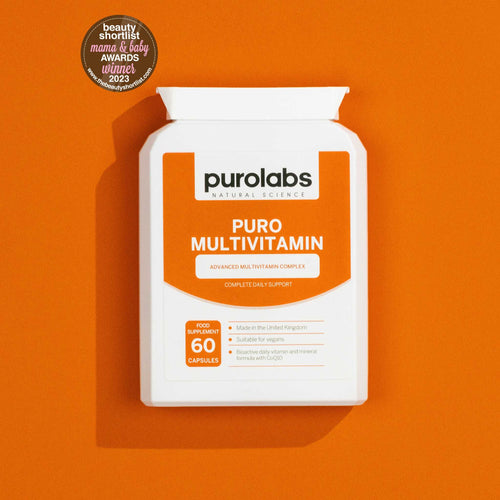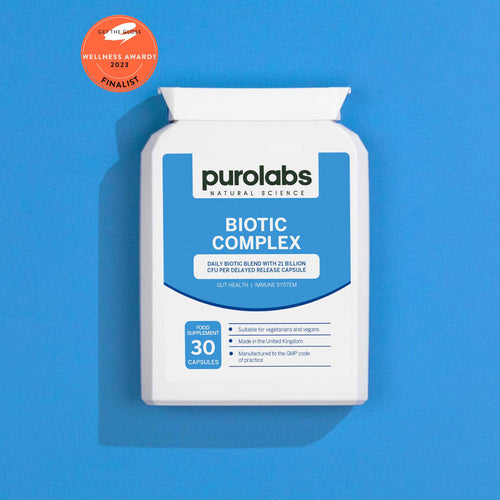There is understandably much confusion when it comes to nutrients and their role in immune health.
It can be hard to decipher between fact and fiction, with many sources claiming that loading up on nutrients will guarantee protection against colds and viruses. Other sources claim that there is little room for supplementation when it comes to immune health, and that supplements are simply marketing hype.
The truth is far more nuanced.
Key Immune Boosting Nutrients
The research does support the following nutrients as star players when it comes to immune health and should be considered when focusing on daily dietary and supplement intake:
Vitamin A – Key nutrient for skin immunity/microbiome1. Vitamin A deficiency impacts both the innate and adaptive immune system, including inflammatory T cell & cytokine activity2. Supports the mucosal lining of the throat, eyes, nose, and entire digestive tract.
B vitamins (B6, Folate, B12) – Important for antibody production and red blood cell formation.
Vitamin C – Antioxidant, antiviral and antimicrobial properties3. Deficiency has been linked to impaired immune function and susceptibility to infections.
Vitamin D – Receptors can be found on B & T cells4. Modulates immune response. Vitamin D deficiency has been linked to autoimmune disease.
Zinc – An immune regulating antioxidant. Key nutrient for normal functioning of the immune system, involved in signalling pathways in innate and adaptive immune cells5.
Copper – Deficiency has been linked to impaired production of T cells and white blood cells6.
Selenium – An antioxidant anti-inflammatory nutrient, contributing to glutathione peroxidase, a key antioxidant liver enzyme used in detoxification7
Magnesium – Supports immune cell function and the nervous system which supports immune health8.
In this article, we will separate truth from myth and provide evidence-based information to help you confidently navigate your immune health.
Myth: Supplements Improve Immunity More than Diet
It can be easy to rely on supplements to boost health, and many find comfort in proactively taking them to support overall health and wellbeing.
I recommend supplements in the clinic as when administered correctly, can have a profound impact on a client’s health journey.
However, they must be viewed as part of a much broader picture when it comes to supporting immunity and should be viewed as one component of a varied and comprehensive daily health toolkit.
Fact: A Well-Rounded Diet & Lifestyle Supports Immune Health
It is important to reiterate that it doesn’t mean that supplements do not play a role; they certainly do.
Busy lifestyles, convenience & dietary preferences do lead to supplements being a handy tool to help keep nutrient levels topped up, however relying on supplements alone to support immune health can be limiting.
We must always consider the fundamentals, like a healthy nutrient-packed diet and balanced lifestyle before we add supplements which should be viewed as a carefully curated cherry on top.
The fundamentals when it comes to health are the key pillars that whilst seemingly simple, can make a profound impact on your immune health:
Dietary considerations include:
- Limit alcohol, high sugar and ultra processed foods as they are pro inflammatory and place strain on the immune system.
- Include anti-inflammatory immune boosting herbs & spices: Turmeric, garlic, rosemary, olive leaf, oregano, ginger9.
- Opt for a whole foods dominant diet with a variety of fruits and vegetables10
- Three portions of Omega-3 fatty fish per week. Sources include salmon, mackerel, anchovies, sardines, herring as Omega-3 has been shown to be a key immune system modulating nutrient11
Lifestyle adaptations include:
- Stress management is one of the most profound ways in which you can support your immune system. Spending time in nature, connecting with loved ones, intentional breathing, taking a bath are just a few ways in which you can support your nervous and immune system.
- Sunshine. Nature's vitamin D. Exposing your skin to 9 minutes of sunlight during your lunchtime hour can provide your daily dose of vitamin D in a highly absorbable method12.
- Sleep deprivation has been shown to directly correlate with increased immune dysregulation13. Aim for at least 7 hours of uninterrupted sleep each evening.
Myth: Mega Dose with Single Vitamins
Avoiding nutrient deficiency is key for immune health, however; mega dosing can be dangerous.
Mega dosing refers to taking large doses of nutrients, usually many times higher than the recommended dietary allowance (RDA). It usually occurs when there has been a suspected or diagnosed nutrient deficiency.
Mega dosing is particularly problematic when it comes to fat soluble nutrients (Vitamin A, D, E, K) which are stored in the liver to be used by the body, with mega dosing potentially toxic to the liver.
In fact, it can be detrimental to immune health and can subsequently negatively impact immune function.
In certain circumstances, like vitamin D deficiency in high risk patients14, a short-term course of very high dose vitamin D may be recommended by your doctor. Unless you have been directed by a licensed health practitioner, do avoid mega doses of any single nutrient.
Fact: A Multivitamin is Usually a Better Approach
Whilst a cliché phrase, balance really is key to all facets of health including the immune system.
Unless you have been diagnosed with a particular nutrient deficiency and are following the recommendations of a licensed healthcare practitioner, taking a good quality multivitamin can top up key immune-related nutrients like Vitamin A, D, E, K & Zinc without leading to nutrient toxicity.

Multivitamin
Nutrient toxicity is far less a risk with water soluble vitamins like the B vitamin complex you’ll find in our multivitamin. Intake above what the body needs is excreted through urine, making our potent blend ideal for those looking to safely boost their nutrient levels.
Myth: Getting Enough Nutrients Is Enough to Protect Your Immune System
People may take a dose of vitamin C or D to stave off the common cold. Zinc is also a common nutrient which is taken during a particularly nasty virus to try and support the immune system in recovery.
However, how your body utilises them and how other bodily systems are operating are just as, if not more important in the fight against viruses and other unwelcome guests.
Fact: Good Gut Health is Key for a Thriving Immune System
You can’t argue with the research. Over 70% of the immune system resides in the gut15.
Focusing on nutrient intake whilst avoiding the complex system which digests and utilises those nutrients to support immune health can be limiting.
Countless studies support the positive link between a diverse, thriving microbiome and strong immune function.
The diverse ecosystem that lives in the gut communicates with immune cells and effectively ‘train’ them to distinguish between friend and foe – helping to regulate the immune system.
Dysbiosis, aka an unfavourable ratio of bad to good gut bugs disrupts immune function through inflammatory byproducts which can weaken defences and increase susceptibility to infections and auto-immune responses.
Our biotic complex at Purolabs directly supports the microbiome by delivering 15 scientifically backed strains of beneficial bacteria to the gut, helping to boost immune function.


 Beauty
Beauty
 Bone Health
Bone Health
 Brain Health
Brain Health
 Energy
Energy
 Eye Health
Eye Health
 Gut Health
Gut Health
 Hair
Hair
 Hormonal Health
Hormonal Health
 Heart Health
Heart Health
 Immunity
Immunity
 Joints
Joints
 Menopause
Menopause
 Pregnancy
Pregnancy
 Kids
Kids
 Sleep
Sleep
 Stress & Mood
Stress & Mood




















